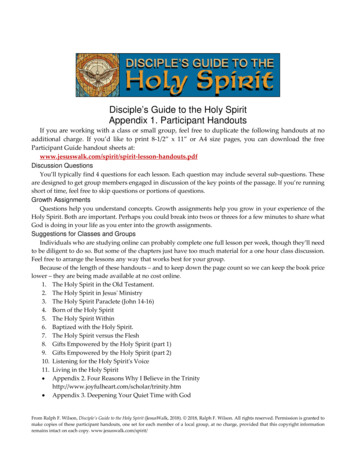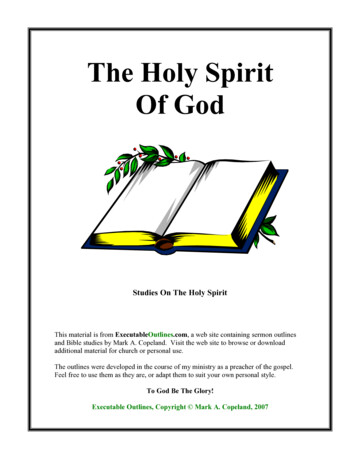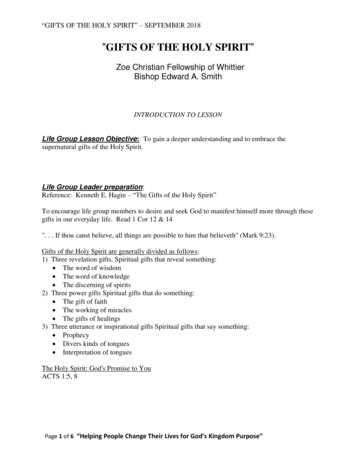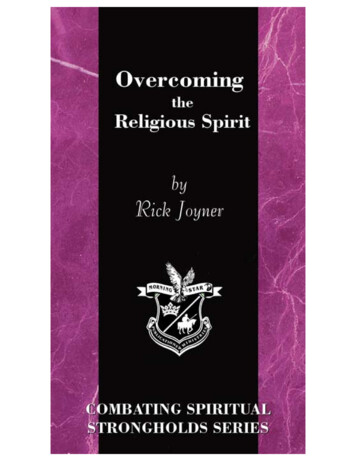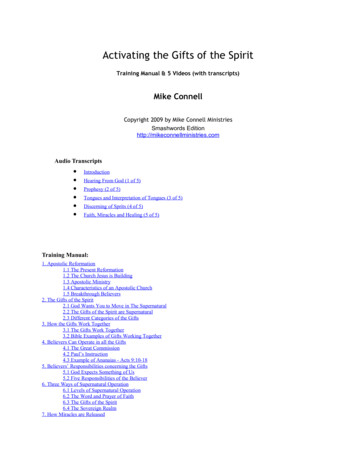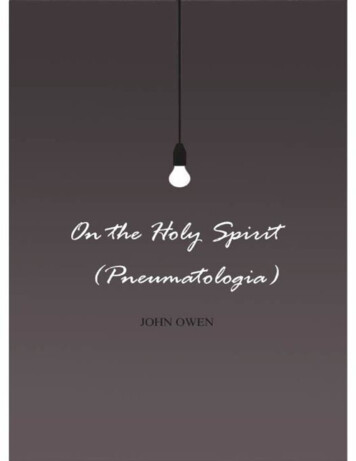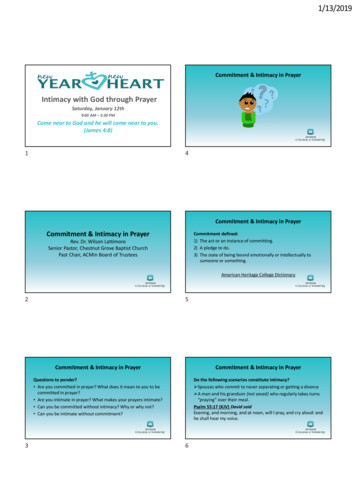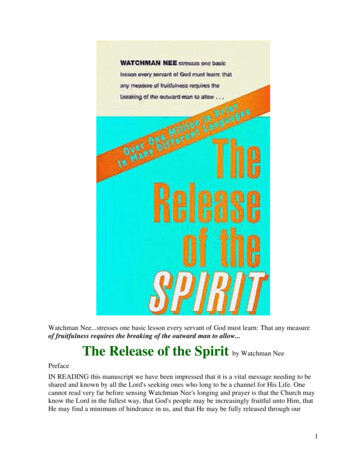
Transcription
Watchman Nee.stresses one basic lesson every servant of God must learn: That any measureof fruitfulness requires the breaking of the outward man to allow.The Release of the Spirit by Watchman NeePrefaceIN READING this manuscript we have been impressed that it is a vital message needing to beshared and known by all the Lord's seeking ones who long to be a channel for His Life. Onecannot read very far before sensing Watchman Nee's longing and prayer is that the Church mayknow the Lord in the fullest way, that God's people may be increasingly fruitful unto Him, thatHe may find a minimum of hindrance in us, and that He may be fully released through our1
quickened and controlled spirit.Surely this is the hour when the battleground is in the soul. While the Lord is seeking to workthrough the quickened spirit, Satan is seeking to work through the natural, soulish life which hasnot been brought under control of the Spirit.In his many years of laboring with fellow workers, Brother Nee has clearly seen the absolutenecessity of brokenness. It is almost as if he were personally here upon the religious scene inAmerica sensing the great need for brokenness among Christian workers. There may be somewho are unprepared for such a bitter dose of spiritual medicine, yet we believe anyone withdiscernment and hunger will agree that the breaking of the soul-powers is imperative if thehuman spirit is to express the Life of the Lord Jesus.Second Preface: October 1976Rejoice with us! One million copies in ten languages are now in print. In this present hour,when the religious scene is occupied with subjectivism and emotional experiences, it seemseven more important (than it was twelve years ago when this book was first published) that eachone of God's children understand his basic make-up and function of his spirit, soul and body.For those who are truly pressing for the prize and the upward calling this is indeed a truth mostimperative. We trust then that this message shall reach every part of the Body of Christ andaccomplish a release of His life. May it be so for His eternal glory, praise and honor!The PublishersIntroductionFor the reader to properly appreciate these lessons, perhaps a few preparatory statements will behelpful Firstly, we must become accustomed to the terminology which Brother Nee uses. He haschosen to call man's spirit the inner man; he calls man's soul the outer man and for the body heuses the term, the outermost man. In the diagram we have pictured this. It will also help torealize that in designing man originally, God intended for man's spirit to be His home ordwelling place. So the Holy Spirit making a union with the human spirit was to govern the soul,and the spirit and soul would use the body as the means of expression.Secondly, when Watchman Nee speaks of destroying the soul, it may seem he is using toostrong a word as though to imply annihilation. Actually the whole substance of his messageclearly points out that the soul, instead of functioning independently, must become the organ or2
vessel for the spirit. So it is the independent action of the soul that must be destroyed. T. A.Sparks has wisely pointed out:"We must be careful that, in recognizing the fact that the soul has been seduced, led captive,darkened and poisoned with a self-interest, we do not regard it as something to be annihilatedand destroyed in this life. This would be asceticism, a form of Buddhism. The result of any suchbehavior is usually only another form of soulishness in an exaggerated degree; perhapsoccultism. Our whole human nature is in our souls, and if nature is suppressed in one directionshe will take revenge in another. This is just what is the trouble with a great many people if onlythey knew it. There is a difference between a life of suppression and a life of service.Submission, subjection and servanthood in Christ's case, as to the Father, was not a life of souldestruction, but of rest and delight. Slavery in its bad sense is the lot of those who live wholly intheir own souls. We need to revise our ideas about service, for it is becoming more and morecommon to think that service is bondage and slavery; when really it is a Divine thing.Spirituality is not a life of suppression. That is negative. Spirituality is positive; it is a new andextra life, not the old one striving to get the mastery of itself."Thirdly, we must see how the soul has to be smitten a fatal blow by the death of Christ as to itsself-strength and government. As with Jacob's thigh, after God had touched it he went to the endof his life with a limp. This would illustrate clearly that forever there must be registered in thesoul the fact that it cannot and must not act out from itself as the source. Again T. A. Sparkswrites "As an instrument the soul has to be won, mastered and ruled in relation to the higher anddifferent ways of God. It is spoken of so frequently in the Scriptures as being some thing overwhich we have to gain and exercise authority. For instance:'In your patience ye shall win your souls.' Luke 21:19'Ye have purified your souls in your obedience to the truth.' I Pet. 1:22'The end of your faith, even the salvation of your souls.' I Pet. 1:9Finally, in these lessons we must see why Watchman Nee insists that the soul (outer man) bebroken, be mastered and be renewed for the spirit to use. T. A. Sparks has said:"Whether we are able yet to accept it or not, the fact is that if we are going on with God fully,all the soul's energies and abilities for knowing, understanding, sensing and doing will come toan end, and we shall-on that side-stand bewildered, dazed, numbed and impotent. Then, only anew, other, and Divine understanding, constraint, and energy will send us forward or keep usgoing. At such times we shall have to say to our souls, 'My soul, be thou silent unto God' (Ps.62.5) ; and 'My soul, come thou with me to follow the Lord.' But what joy and strength there iswhen, the soul having been constrained to yield to the spirit, the higher wisdom and glory isperceived in its vindication. Then it is that 'My soul doth magnify the Lord, and my spirit hathrejoiced in God my Saviour" (Luke 1:46). The spirit HATH, the soul DOTH-note the tenses.So that unto fullness of joy the soul is essential, and it MUST be brought through the darknessand death of its own ability to learn the higher and deeper realities for which the spirit is the firstorgan and faculty."As we approach the end of these lessons we shall have found the secret of fruitful living unto3
HIM. Do not fall into the snare, as so many have, of trying to suppress your soul or of despisingit ; but be strong in spirit, so that your soul may be won, saved and made to serve His fullest joy.The Lord Jesus has planned that we should find rest unto our souls, and this, He says, comes byway of His yoke-the symbol of union and service. We shall then appreciate how the soul findsits greatest value in service, not in ruling. True, until broken, the soul wants to be master.Through the Cross it can become a very useful servant.(Quotes from: WHAT IS MAN by T. A. Sparks)Chapter IThe Importance of BrokennessANYONE who serves God will discover sooner or later that the great hindrance to his work isnot others but himself. He will discover that his outward man and his inward man are not inharmony, for both are tending toward opposite directions. He will also sense the inability of hisoutward man to submit to the spirit's control, thus rendering him incapable of obeying God'shighest commands. He will quickly detect that the greatest difficulty lies in his outward man, forit hinders him from using his spirit.Many of God's servants are not able to do even the most elementary works. Ordinarily theyshould be enabled by the exercise of their spirit to know God's word, to discern the spiritualcondition of another, to send forth God's messages under anointing and to receive God'srevelations. Yet due to the distractions of the outward man, their spirit does not seem to functionproperly. It is basically because their outward man has never been dealt with. For this reasonrevival, zeal, pleading and activity are but a waste of tune. As we shall see, there is just onebasic dealing which can enable man to be useful before God: brokenness.The Inward Man and the Outward ManNotice how the Bible divides man into two parts: "For I delight in the law of God according tothe inward man" (Rom. 7:22). Our inward man delights in the Law of God. ". . . To bestrengthened with power by his Spirit in the inner man" (Eph. 3:16). And Paul also tells us, "Butif indeed our outward man is consumed, yet the inward is renewed day by day" (2 Cor. 4:16).When God comes to indwell us by His Spirit, life and power, He comes into our spirit which weare calling the inward man. Outside of this inward man is the soul wherein function ourthoughts, emotions and will. The outermost man is our physical body. Thus we will speak of theinward man as the spirit, the outer man as the soul and the outermost man as the body. We mustnever forget that our inward man is the human spirit where God dwells, where His Spiritmingles with our spirit. Just as we are dressed in clothes, so our inward man "wears" an outwardman: the spirit "wears" the soul. And similarly, the spirit and soul "wear" the body. It is quiteevident that men are generally more conscious of the outer and outermost man, and they hardlyrecognize or understand their spirit at all.We must know that he who can work for God is the one whose inward man can be released. Thebasic difficulty of a servant of God lies in the failure of the inward man to break through the4
outward man. Therefore we must recognize before God that the first difficulty to our work is notin others but in ourselves. Our spirit seems to he wrapped in a covering so that it cannot easilybreak forth. If we have never learned how to release our inward man by breaking through theoutward man, we are not able to serve. Nothing can so hinder us as this outward man. Whetherour works are fruitful or not depends upon whether our outward man leas been broken by theLord so that the inward man can pass through that brokenness and come forth. This is the basicproblem. The Lord wants to break our outward man in order that the inward man may have away out. When the inward man is released, both unbelievers and Christians will be blessed.Nature Has Its Way of BreakingThe Lord Jesus tells us in John 12, "Except the grain of wheat falling into the ground die, itabides alone; but if it die, it bears much fruit." Life is in the grain of wheat, but there is a shell, avery hard shell on the outside. As long as that shell is not split open, the wheat cannot sproutand grow. "Except the grain of wheat falling into the ground die . . . " What is this death? It isthe cracking open of the shell through the working together of temperature, humidity, in the soil.Once the shell is split open, the wheat begins to grow. So the question here is not whether thereis life within, but whether the outside shell is cracked open.The Scripture continues by saying, "He that loves his life (Greek, soul) shall lose it, and he thathates his life (Greek, soul) in this world shall keep it to life eternal" (v. 25). The Lord shows ushere that the outer shell is our own life (our soul life), while the life within is the eternal lifewhich He has given to us. To allow the inner life to come forth, it is imperative that the outwardlife be replaced. Should the outward remain unbroken, the inward would never be able to comeforth.It is necessary (in this writing) that we direct these words to that group of people who have theLord's life. Among those who possess the life of the Lord can be found two distinct conditions:one includes those in whom life is confined, restricted, imprisoned and unable to come forth; theother includes those in whom the Lord has forged a way, and life is thus released from them.The question thus is not how to obtain life, but rather how to allow this life to come forth. Whenwe say we need the Lord to break us, this is not merely a way of speaking, nor is it only adoctrine. It is vital that we be broken by the Lord. It is not that the life of the Lord cannot coverthe earth, but rather that His life is imprisoned by us. It is not that the Lord cannot bless thechurch, but that the Lord's life is so confined within us that there is no flowing forth. If theoutward man remains unbroken, we can never be a blessing to His church, and we cannot expectthe word of God to be blessed by Him through us!The Alabaster Box Must Be BrokenThe Bible tells of the pure spikenard. God purposely used this term "pure" in His word to showthat it is truly spiritual. But if the alabaster box is not broken, the pure spikenard will not flowforth. Strange to say, many are still treasuring the alabaster box, thinking that its value exceedsthat of the ointment. Many think that their outward man is more precious than their inward man.This becomes the problem in the church. One will treasure his cleverness, thinking he is quiteimportant; another will treasure his own emotions, esteeming himself as an important person;others highly regard themselves, feeling they are better than others, their eloquence surpassesthat of others, their quickness of action and exactness of judgment are superior, and so forth.5
However, we are not antique collectors; we are not vase admirers; we are those who desire tosmell only the fragrance of the ointment. Without the breaking of the outward, the inward willnot come forth. Thus individually we have no flowing out, but also the church does not have aliving way. Why then should we hold ourselves as so precious, if our outward contains insteadof releases the fragrance?The Holy Spirit has not ceased working. One event after another, one thing after another, comesto us. Each disciplinary working of the Holy Spirit has but one purpose: to break our outwardman so that our inward man may come through. Yet here is our difficulty: we fret over trifles,we murmur at small losses. The Lord is preparing a way to use us, yet scarcely has His handtouched us when we feel unhappy, even to the extent of quarreling with God and becomingnegative in our attitude. Since being saved, we have been touched many times in various waysby the Lord, all with the purpose of breaking our outward man. Whether we are conscious of itor not, the aim of the Lord is to break this outward man.So the Treasure is in the earthen vessel, but if the earthen vessel is not broken, who can see theTreasure within? What is the final objective of the Lord's working in our lives? It is to break thisearthen vessel, to break our alabaster box, to crack open our shell. The Lord longs to find a wayto bless the world through those who belong to Him. Brokenness is the way of blessing, the wayof fragrance, the way of fruitfulness, but it is also a path sprinkled with blood. Yes, there isblood from many wounds. When we offer ourselves to the Lord to be at His service, we cannotafford to be lenient, to spare ourselves. We must allow the Lord utterly to crack our outwardman, so that He may find a way for His out working.Each of us must find out for himself what is the mind of the Lord in his life. It is a mostlamentable fact that many do not know what is the mind or intention of the Lord for their lives.How much they need for Him to open their eyes, to see that everything which comes into theirlives can be meaningful. The Lord has not wasted even one thing. To understand the Lord'spurpose, is to see very clearly that He is aiming at a single objective: the breaking of theoutward man.However, too many, even before the Lord raises a hand, are already upset. Oh, we must realizethat all the experiences, troubles and trials which the Lord sends us are for our highest good. Wecannot expect the Lord to give better things, for these are His best. Should one approach theLord and pray, saying, "O Lord, please let me choose the best," I believe He would tell him,"What I have given you is the best; your daily trials are for your greatest profit." So the motivebehind all the orderings of God is to break our outward man. Once this occurs and the spirit cancome forth, we begin to be able to exercise our spirit.The Timing in Our BrokennessThe Lord employs two different ways to break our outward man; one is gradual, the othersudden. To some, the Lord gives a sudden breaking followed by a gradual one. With others, theLord arranges that they have constant daily trials, until one day He brings about large-scalebreaking. If it is not the sudden first and then the gradual, then it is the gradual followed by thesudden. It would seem the Lord usually spends several years upon us before He can accomplishthis work of breaking.The timing is in His hand. We cannot shorten the time, though we certainly can prolong it. In6
some lives the Lord is able to accomplish this work after a few years of dealing; in others it isevident that after ten or twenty years the work is still unfinished. This is most serious! Nothingis more grievous than wasting God's time. How often the church is hindered! We can preach byusing our mind, we can stir others by using our emotions; yet if we do not know how to use ourspirit, the Spirit of God cannot touch people through us. The loss is great, should we needlesslyprolong the time.Therefore, if we have never before wholly and intelligently consecrated ourselves to the Lord,let us do so now, saying: "Lord, for the future of the church, for the future of the gospel, for Thyway, and also for my own life, I offer myself without condition, without reservation, into Thyhands. Lord, I delight to offer myself unto Thee and am willing to let Thee have Thy full waythrough me."The Meaning of the CrossOften we hear about the cross. Perhaps we are too familiar with the term. But what is the crossafter all? When we really understand the cross we shall see it means the breaking of the outwardman. The cross reduces the outward man to death; it splits open the human shell. The cross mustbreak all that belongs to our outward man, our opinions, our ways, our cleverness, our self-love,our all. The way is clear, in fact crystal clear.As soon as our outward man is broken, our spirit can easily come forth. Consider a brother as anexample. All who know him acknowledge that he has a keen mind, a forceful will, and deepemotions. But instead of being impressed by these natural characteristics of his soul, they realizethey have met his spirit. Whenever people are fellowshipping with him, they encounter a spirit,a clean spirit. Why? Because all that is of his soul has been dealt with.Take as another example, a sister. Those who know her recognize that she is of a quickdisposition, quick in thought, quick of speech, quick to confess, quick in writing letters, andquick to tear up what she has written. However, those who meet her do not meet her quicknessbut rather her spirit. She is one who has been utterly broken and has become transparent. Thisbreaking of the outward man is such a basic matter. We should not cling to our weak, soulishcharacteristics, still emitting the same fragrance even after five or ten years of the Lord's dealingwith us. No, we must allow the Lord to forge a way in our lives.Two Reasons for Not Being BrokenWhy is it that after many years of dealing some remain the same? Some individuals have aforceful will; some have strong emotions; and others have a strong mind. Since the Lord is ableto break these, why is it that after many years some are still unchanged? We believe there aretwo main reasons.First, many who live in darkness are not seeing the hand of God. While God is working, whileGod is breaking , they do not recognize it as being from Him. They are devoid of light, seeingonly men opposing them. They imagine their environment is just too difficult, thatcircumstances are to blame. So they continue in darkness and despair.May God give us a revelation to see what is from His hand, that we may kneel down and say toHim, "It is Thou; since it is Thou, T will accept." At least we must recognize whose hand it is7
that deals with us. It is not a human hand, nor our family's, not the brothers' and sisters' in thechurch, but God's. We need to learn how to kneel down and kiss the hand, love the hand thatdeals with us, even as Madame Guyon did. We must have this light to see that whatever theLord has done, we accept and believe; the Lord can do no wrong.Second, another great hindrance to the work of breaking the outer man is self-love. We must askGod to take away the heart of self-love. As He deals with us in response to our prayer, weshould worship and say, "O Lord, if this be Thy hand, let me accept it from my heart." Let usremember that the one reason for all misunderstanding all fretfulness, all discontent, it that wesecretly love ourselves. Thus we plan a way whereby we can deliver ourselves. Many timesproblems arise due to our seeking a way of escape, an escape from the working of the cross.He who has ascended the cross and refuses to drink the vinegar mingled with gall is the one whoknows the Lord. Many go up to the cross rather reluctantly, still thinking of drinking vinegarmingled with gall to alleviate their pains. All who say, "The cup which the Father has given me,shall I not drink it?" will not drink the cup of vinegar mingled with gall. They can only drink ofone cup, not two. Such as these are without any self-love. Self-love is a basic difficulty. May theLord speak to us today that we may be able to pray: "O my God, I have seen that all thingscome from Thee. All my ways these five years, ten years, or twenty years, are of Thee. Thouhast so worked to attain Thy purpose, which is none other than that Thy life may be lived outthrough me. But I have been foolish. I did not see. I did many things to deliver myself, thusdelaying Thy time. Today I see Thy hand. I am willing to offer myself to Thee. Once again Iplace myself in Thy hands."Expect to See WoundsThere is no one more beautiful than one who is broken! Stubbornness and self-love give way tobeauty in one who has been broken by God. We see Jacob in the Old Testament, how even inhis mother's womb he struggled with his brother. He was subtle, tricky, deceitful. Yet his lifewas full of sorrows and grief. When a youth, he fled from home. For twenty years he wascheated by Laban. The wife of his heart's love, Rachel, died prematurely. The son of his love,Joseph, was sold. Years later Benjamin was detained in Egypt. He was successively dealt withby God, meeting misfortune after misfortune. He was stricken by God once, twice; indeed, hiswhole history could be said to be a history of being stricken by God. Finally after many suchdealings, the man Jacob was transformed. In his last few years, he was quite transparent. Howdignified was his answer to Pharaoh! How beautiful was his end, when he worshipped God onhis staff! How clear were his blessings to his descendants! After reading the last page of hishistory, we want to bow our heads and worship God. Here is one who is matured, who knowsGod. Several decades of dealings have resulted in Jacob's outward man being broken. In his oldage, the picture is a beautiful one.Each of us has much of the same Jacob nature in us. Our only hope is that the Lord may blaze away out, breaking the outward man to such a degree that the inward man may come out and beseen. This is precious, and this is the way of those who serve the Lord. Only thus can we serve;only thus can we lead men to the Lord. All else is limited in its value. Doctrine does not havemuch use nor does theology. What is the use of mere mental knowledge of the Bible if theoutward man remains unbroken? Only the person through whom God can come forth is useful.8
After our outward man has been stricken, dealt with, and led through various trials, we havewounds upon us, thus allowing the spirit to emerge. We are afraid to meet some brothers andsisters whose whole being remains intact, never having been dealt with and changed. May Godhave mercy upon us in showing us clearly this way and in revealing to us that it is the only way.May He also show us that herein is seen the purpose of all His dealings with in these few years,say ten or twenty. Thus let no one despise the Lord's dealings. May He truly reveal to us what ismeant by the breaking of the outward man. Should the outward man remain whole, everythingwould be merely in our mind, utterly expect the Lord to deal with us thoroughly.CHAPTER IIBefore And After BrokenessTHE BREAKING of the outward man is the basic experience of all who serve God. This mustbe accomplished before He can use us in an effective way.When one is working for God, two possibilities may arise. First, it is possible that with theoutward man unbroken, one's spirit may be inert and unable to function. If he is a clever person,his mind governs his work; if he is a compassionate person, the emotions control his actions.Such work may appear successful but cannot bring people to God. Second, his spirit may comeforth clad in his own thoughts or emotions. The result is mixed and impure. Such work willbring men into mixed and impure experience. These two conditions weaken our service to God.If we desire to work effectively, we must realize that basically "it is the Spirit which quickens."Sooner or later, if not on the first day of our salvation, then perhaps ten years after, we mustrecognize this fact. Many have to be brought to their wits' end to see the emptiness of their laborbefore they know how useless are their many thoughts, their varied emotions. No matter howmany people you can attract with your thoughts or emotions, the result comes to nothing.Eventually we must confess: "It is the Spirit which quickens." The Spirit alone makes peoplelive. Your best thought, your best emotion cannot make people live. Man can be brought intolife only by the Spirit. Many serving the Lord come to see this fact only after passing throughmuch sorrow and many failures. Finally the Lord's word becomes meaningful to them: thatwhich quickens is the Spirit. When the spirit is released then sinners may be born anew andsaints may be established. When life is communicated through the channel of the spirit, thosewho receive it are born anew. When life is supplied through the spirit to believers, it results intheir being established. Without the Spirit, there can be no new birth and no establishment.One rather remarkable thing is that God does not mean to distinguish between His Spirit and ourspirit. There are many places in the Bible where it is impossible to determine whether the word"spirit" indicates our human spirit or God's Spirit. Bible translators, from Luther down topresent day scholars who have labored on the English versions, have been unable to decide ifthe word "spirit," as used in many places in the New Testament, refers to the human spirit or tothe Spirit of God.Of the whole Bible, Romans eight may very well be the chapter where the word "spirit" is usedmost frequently. Who can discern how many times the word "spirit" in this chapter refers to thehuman spirit and how many times to God's Spirit? In various English versions, the word"pneuma" (spirit) is sometimes written with a capital letter; other times, with a small letter. It isevident that these versions do not agree, and no one person's opinion is final. It is simply9
impossible to distinguish. When in regeneration we receive our new spirit, we receive God'sSpirit too. The moment our human spirit is raised from the state of death, we receive the HolySpirit. We often say that the Holy Spirit dwells in our spirit, but we find it hard to discern whichis the Holy Spirit and which is our own spirit. The Holy Spirit and our spirit have become somingled; while each is unique they are not easily distinguished.Thus, the release of the spirit is the release of the human spirit as well as that of the Holy Spirit,Who is in the spirit of man. Since the Holy Spirit and our spirit are joined into one, (1 Cor.6.17), they can be distinguished only in name, not in fact. And since the release of one meansthe release of both, others can touch the Holy Spirit whenever they touch our spirit. Thank Godthat inasmuch as you allow people to contact your spirit, you allow them to contact God. Yourspirit has brought the Holy Spirit to man.When the Holy Spirit is working, He needs to be carried by the human spirit. The electricity inan electric bulb does not travel like lightning. It must be conducted through electric wires. If youwant to use electricity, you need an electric wire to bring it to you. In like manner, the Spirit ofGod employs the human spirit as His carrier, and through it He is brought to man.Everyone who has received grace has the Holy Spirit dwelling in his spirit. Whether he can beused by the Lord depends not on his spirit but rather on his outward man. The difficulty withmany is that their outward man has not been broken. There is not evident that blood-markedcharacter those wounds or scars. So God's Spirit is imprisoned within man's spirit and is not ableto break forth. Sometimes our outward man is active, but the inward man remains inactive. Theoutward man has gone forth, while the inward man lags behind.Some Practical ProblemsLet us review this through some practical problems! Take preaching, for instance. How often wecan be earnestly preaching, giving a well prepared, sound message, but inwardly feel as cold asice. We long to stir others, yet we ourselves are unmoved. There is a lack of harmony betweenthe outward and the inward man. The outward man is dripping from the heat, but the inwardman is shivering from the cold. We can tell others how great the love of the Lord is, yet we arepersonally untouched by it. We can tell others how tragic is the suffering of the cross, yet uponreturning to our room we can laugh. Wh
The Release of the Spirit by Watchman Nee Preface IN READING this manuscript we have been impressed that it is a vital message needing to be shared and known by all the Lord's seeking ones who long to be a channel for His Life. One cannot read very far before sensing Watchman Nee's longing and prayer is that the Church may


